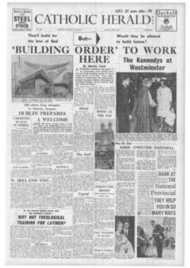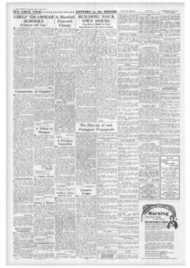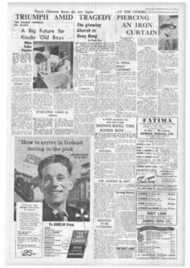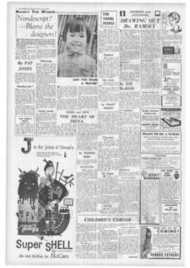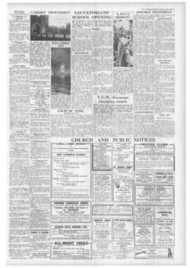Page 4, 9th June 1961
Page 4
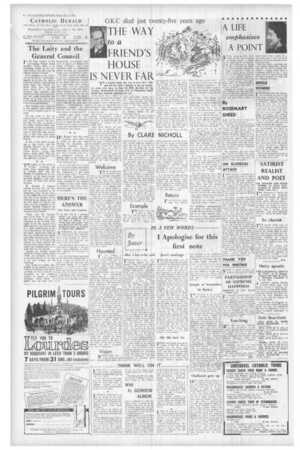
Report an error
Noticed an error on this page?If you've noticed an error in this article please click here to report it.
Tags
Share
Related articles
Pope's Concern Over Jesuit Activity
Vatican Council
Laity And Clergy: A Mutual Concern And Commitment
Study Conferences Planned
Marriage Courses
The Laity and the General Council
IN the June number of the
outstanding French Jesuit monthly, Etudes, there is an interesting article on the relations between the laity and the coming General Council,
In a footnote to the article. the results of an "on-the-spot" enquiry as to how far and in what way French Catholics had heard about the Council are given. More than half had never heard of it. Of the minority, the majority had heard of it from press and radio and very small minorities had heard of it from the pulpit, from Catholic organisations and from casual conversation,
One wonders how Catholics in this country would show up if a similar enquiry were to be made.
Yet the truth is that the Council and its preparation not only deeply concern the laity, but that the laity, as members of Christ's Mystical Body, may and should, at least in principle, find representation in it in the sense at least that their prayers and, if they wish, their views should help towards its fullest fruition.
It was in this spirit, according to this article, that Dr. Roegele, Director of the German Catholic weekly, Rheinischer Merkur, recently published a book called "What Do We Expect of the Council? The Thoughts of a Layman."
* *
THE author of the article in Etudes, reviewing this book, states categorically that its contents show that Dr. Roegele is anything but a revolutionary in his ideas—though we doubt whether in this country quite the same view would he taken.
Dr. Roegele, it appears, laments the fact that the laity has not been consulted in the preparatory work of the Council. He thinks that this is probably due to the memory of lay influence in the distant days of the past when lay princes and rulers were in a position to influence General Councils for purposes very far removed from the good of the Church.
Today, says Dr. Roegele. there could never be any question of such abuse. The representations of the Catholic laity would be for the purpose of a fuller service to the Church and of a fuller participation in the life of the Church. He feels that the active preparatory help of the laity would have the double good effect of promoting Christian Unity and of bringing the Church into closer contact with the men of our times whose education and training could be of great value to the Church.
Among the specific points which Dr. Roegele makes, points which. one presumes. he feels to be representative of the laity of his own country, are the following,
One would be a fuller clarification of the position of nonCatholic Christians in the Mystical Body of Christ and the reformation of the juridical position in regard to mixed marriages. These points, together with his hope that a
fundamental ecumenical principle in regard to relations between Catholics and nonCatholics might be established. clearly envisage the siromotion of the cause of Christtan Unity.
On other matters, he appears to go into a good deal of detail about the fundamental reform of the Index. He asks whether it is right today that authors who have received episcopal imprimaturs should find themselves suddenly cited in newspapers as having been put on the Index? Similarly, he argues, is it really right that honourable theologians should find themselves suffering the same ignominious condemnation as notorious enemies of the Church? And need condemnations always be made public?
Another point which would certainly meet with the sympathy of all Catholic journalists is that it should be part of the Church's work today to provide a sure and authorised service of ecclesiastical information.
DR. Roegele feels that such questions. more likely to be raised by the laity than through the episcopate, are especially pertinent to the world of today. Their intrinsic importance he believes should give them a hearing with, maybe, consequent reforms of special value to the Church in its relations with the world of today and tomorrow.
As we have said, it is from the Continent rather than from the English-speaking countries that suggestions of this kind tend to come today. Yet if we have sufficient imagination to foresee the increasing weight of certain problems in the decades to come, we also. surely, should he actively, rather than purely passively, interested in the work of the Council.
blog comments powered by Disqus


